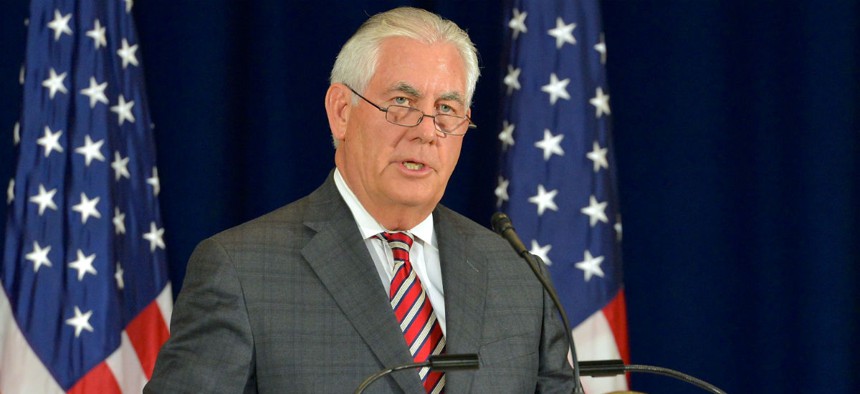
The White House Domestic Policy Council and Secretary of State Rex Tillerson are said to be pondering moving the Bureau of Consular Affairs to Homeland Security. State Department
Ex-Diplomats Protest Trump Plan to Move Key Bureaus Out of State Department
Deputy secretary backtracks on proposal to shift visa approval to Homeland Security.
Amid objections from retired diplomats and some lawmakers, the State Department is seeking to allay concerns over a report that the Trump administration reorganization plans would move visa approval to the Homeland Security Department.
As first reported last month by CNN, the White House Domestic Policy Council and Secretary of State Rex Tillerson are said to be pondering moving the Bureau of Consular Affairs to Homeland Security. That would include about 12,000 employees and $3 billion in revenue, the Washington Post reported, and would be a way to stress domestic security in decisions on granting foreigners entry to the United States.
On Monday, Deputy Secretary of State John Sullivan assured skeptical senators on the Foreign Relations Committee that major decisions along those lines have not been made, the Associated Press reported. Tillerson “does not have at present that intention,” State’s No. 2 told Sen. Jeanne Shaheen, D-N.H. But Sullivan didn’t rule out considering such a move if the department’s final reorganization plan calls for it.
On July 16, more than 30 retired diplomats—among them William Burns, who served under President Obama, and William Howard Taft IV of the George H.W. Bush administration—wrote Tillerson objecting to the plan to move consular affairs, as well as a leaked White House plan to also move State’s Bureau of Population, Refugees and Migration to Homeland Security.
“We are convinced that the elimination of [the population bureau’s] assistance functions would have profound and negative implications for the Secretary of State’s capacity to influence policy issues of key concern to the United States,” the diplomats, joined by humanitarian groups, wrote. “It would also be ironic, as this is one of the bureaus at State that has enjoyed strong bipartisan support over many years.”
Tillerson is also considering, according to a Tuesday Politico report, closing State’s office for cybersecurity, whose occupant, Christopher Painter, has announced his departure at the end of July.
The blog Dipolpundit said the idea of moving consular affairs can be traced to Carl Risch, Trump’s nominee to be assistant Secretary of State for Consular Affairs. At his confirmation hearing on Tuesday, Risch’s written testimony said he would pursue “close cooperation” with Homeland Security. Under questioning from Sen. Robert Menendez, D-N.J., Risch acknowledged that 15 years ago he had proposed such a switch. But currently, Risch said, he intends to follow State’s leadership and “lead the bureau as it is currently formed.”
In a July 14 letter to the Post, retired diplomat Brian McNamara laid out arguments for keeping the visa approval function within State. “Consular officers adjudicate visas, issue reports of birth and death of Americans overseas, adjudicate U.S. passport applications and assist Americans who get into trouble in foreign countries (get arrested, get sick, etc.),” he wrote. “This requires every staffer, from the lowest worker to the highest, to have a good knowledge of the host country and thorough knowledge of the geography (are people from a particular neighborhood more or less likely to stay in the United States?). Consular officers, as do all Foreign Service officers, liaise with local officials, but for consular officers, those local officials include police officers, jailers, doctors and those in the foreign ministry. In other words, consular officers have a much wider span of duties than merely adjudicating visas.”







